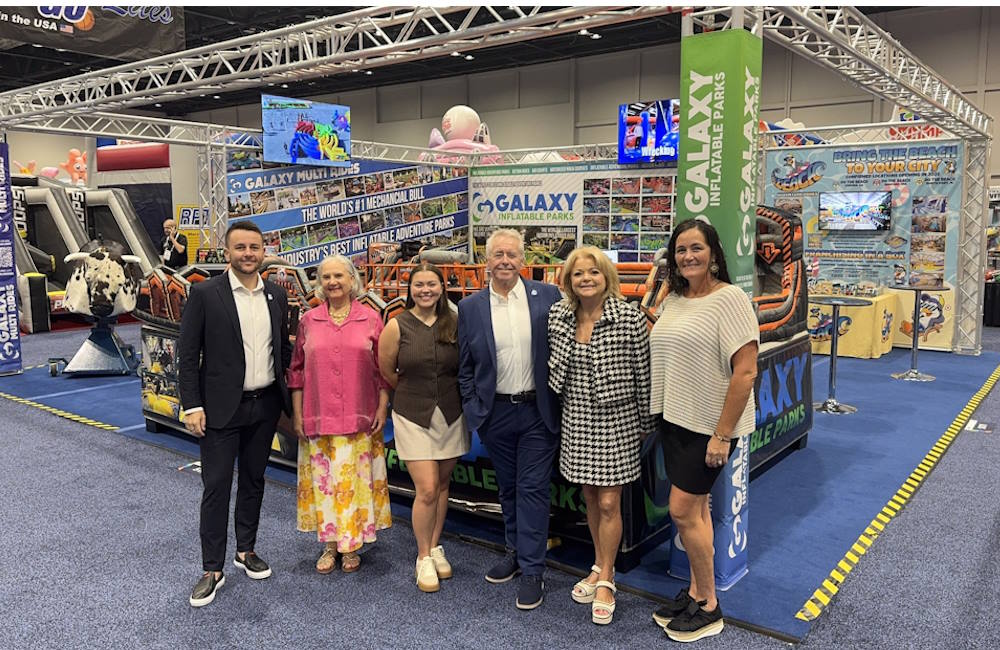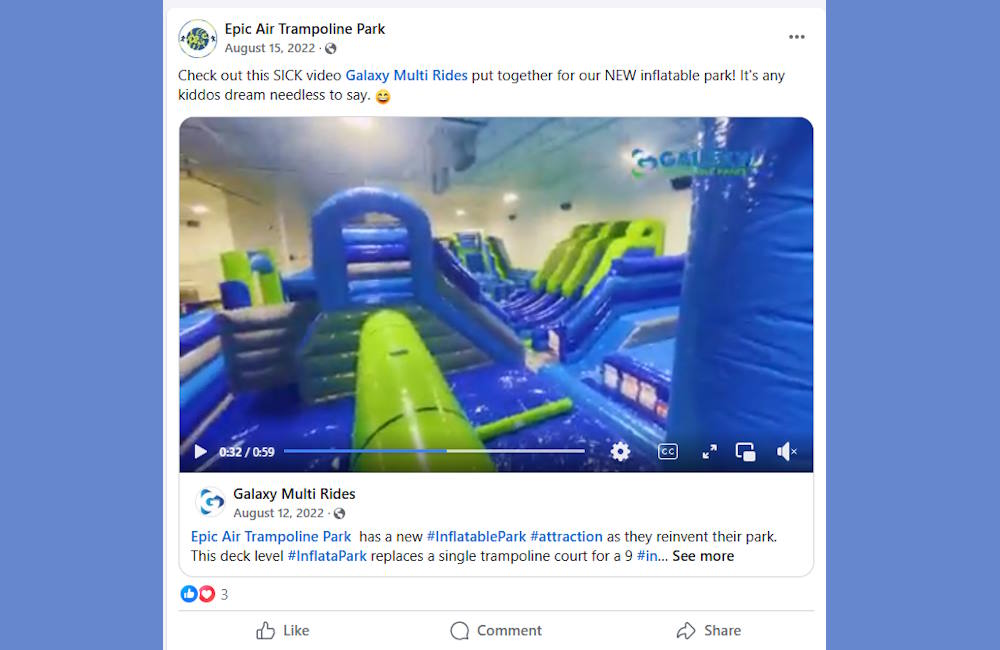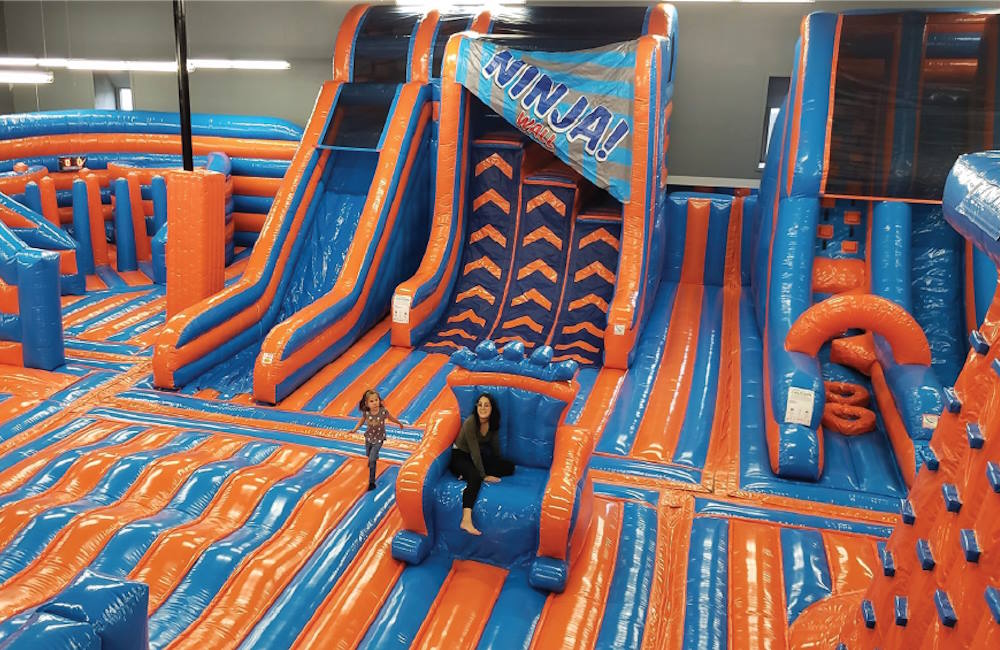I ran across this on Cheryl Pierce’s blog the other day. You may have already seen it, but it has some good suggestions on how to use social media to counter negative publicity! We’d love to hear other ways that you can think of to counter any negatives you come across.
Flying Bounce Houses, Mechanical Bull Rides and Social Media – How They Apply to YOUR Business
That’s a weird title, isn’t it? But the flying bounce house issue is something affects almost every one in the amusement industry. If you watch the videos, the impression is that bounce houses and other inflatables aren’t safe at all.
We went through this a few years ago with the mechanical bull in Indianapolis. Someone got hurt at a fair up north, well, not just hurt, but severely injured. None of the operators really realized what was going on until a year or so later when we found out the state was now requiring 5 million dollar liability insurance and an inspection before a bull could be operated in Indiana. Was the state wise to be concerned? Sure they were, but they didn’t do their homework. My husband and I actually testified for the senate subcommittee and got an amendment stating that the multiride mechanical bull could be exempted if the inspector agreed. Unfortunately, the chief inspector at that time was ill. Although he is the one that told us to request the hearing through our representative, by the time the new amendment passed, our good friend and chief inspector, Bill Franklin had passed away. I no longer live in Indiana and I know the multiride does well there although I think the higher insurance liability is still required.
It all comes down to education, and that’s the responsibility of the operator. As far as I’m concerned a mechanical bull ride is as safe as anything on the market…as long as it’s operated by a trained operator. And I feel just the same way about bounce houses.
But there are some lousy operators out there. Someone wrote to me after the videos started hitting the news that “The small guys are going to hurt things for us all”…but the truth is that the large companies can be just as much at fault. A set up is only as good as the person who did the delivery.
Here’s an example. A large company sends out a well trained delivery person. He gets lost, is running late for deliveries. Sets up the inflatable and, “surprise surprise” his contact person isn’t there now for safety instructions. So he tries to grab someone else, hopefully another adult. But that adult doesn’t turn out to be around for the entire party. What happens when the wind picks up? It probably says on the bounce safety label to shut down the ride if the wind reaches 25 miles per hour but is there even still an adult there with the inflatable? Who is actually watching what’s going on?
From the looks of those videos, I’m guessing the wind was higher than 25 mph, so whose fault was it if the inflatables started flying?
The answer to that is it doesn’t really matter. If someone was hurt or traumatized, then our whole industry is to blame. What are we doing to prevent accidents.
If there are many more accidents, the whole country will be like some of the east coast states…inflatables will have to be operated by trained operators.
Talking people into hiring an attendant is probably the safest answer, although in this economy, many people just won’t do it. Hopefully we can prevent more of this type of stuff happening though, before the attendant issue is forced on every company.
But there is that problem again… what if that trained operator isn’t paying attention, or really isn’t trained all that well.
The answer is education. The amusement industry HAS to be responsible for training the public. And the easiest way to do this is social media. Facebook, Twitter, press releases and blog posts can go a long way to getting the message out there. Call your local paper and see if they’ll do an interview on inflatable safety. Or send in a letter to the editor.
I don’t know how many times I’ve gone to a festival and seen a giant slide with a young attendant looking off in another direction with about 15 kids running up the slide at the same time. The public needs to know that’s not acceptable.
Post safety tips on your Facebook page. Post them on the wall of some area businesses and ask them to repost to their fans. Do WHATEVER it takes to teach people about safety.
The idea of all this isn’t to get you business… but a nice side effect of this is that while you’re teaching safety to the public, you’re establishing yourself as a safety expert.
How about sending out a tweet if the wind picks up on a Saturday afternoon….”wind is picking up, inflatable rides should be shut down.” Post it on your FB page too.
As an owner/operator, you want to do even more than this. Talk about safety on your Social Media Accounts and Blogs, BUT…talk safety on the phone to every client that books an event. Send out safety instructions ahead of time. And send them out again at delivery. Show some of these videos to your employees. Help them understand WHY teaching safety to clients is so important. CALL your clients if gusts of wind are expected, or if it starts to rain. That 30 seconds that it takes for a phone call just might prevent an injury.
So, talk about this on your Facebook page, share tips with the public. Not only can you prevent injuries, you’ll probably find that your business will grow in the process.
If you’d like to learn more about educating consumers about flying bounce houses and other hot topics, visit Cheryl Pierce’s blog: http://www.cherylpierce.com, or email her at cheryl@crackerjack-consulting.com








